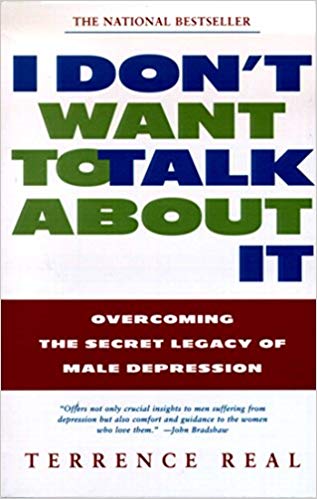

I was loaned a copy of “I don’t want to talk about it.” It was written by Terrence Real. I have read more than half of the book now. And I am drawn like a moth to the flame. I am getting burned, but I can’t stop reading.
I feel like the book is telling me that there is a lot of pain I need to face to feel better.
I’m reading that those who have never felt their own emotions, must deep dive into their past. Once the underlying relationship causes of the depression are acknowledged, then true healing begins.
I do get that I have developed patterns that I can change.
There are clearly unhelpful thinking styles that I am now identifying that, once addressed, are easier to understand and to work with. One of these styles I identified with when Terrence described one of the patients he had worked with. He was:
“Strong, secure, in charge, he was the tree everyone else could lean on.”
That I get. I am “evergreen.” The tree that never loses its leaves and everyone can count on. Terrence goes on to say how this thinking helps form a total denial of his (my) own humanity and the depression.
What I don’t get is that my depression is the result of childhood trauma.
I know that there is a history of “nerves,” of depression in my family. This would seem to pre-dispose me to depression’s grip. And I can see how stress, either real or imagined, could trigger and reinforce a depressive cycle. But to say my depression was caused by my childhood, I’m not convinced.
Certainly, my childhood was not without problems.
But when I read the stories of neglect, beatings, and abandonment that the author portrays in his book, I do not see that in my childhood. My memories of childhood are positive. I feel like I was given tremendous opportunities to explore and to learn all kinds of new things.
During my next therapy appointment, I plan to ask about the author’s theory. Is it possible that I am harboring emotional wreckage from my childhood? If so, what would it be? Do I really need to get in touch with my “inner child” in order to be better as an adult? Of course, now I am thinking about a quote I have read and agree with.
“Those who don’t understand the past, are doomed to repeat it.”
Oh, my goodness. Maybe Terrence has a point. Or maybe it is the way I have hidden my depression throughout my life that I need to examine. I can see that. There’s the chance I need to find better ways to think, better ways to understand if what I am thinking is valid. It is true that I can ask better questions, or get a partner, and even think through the consequences of the thought BEFORE acting.
There was another description of the same patient I identified with. He wrote that the “idea that covert (concealed) depression had anything to do with his ambition and a constant drive to succeed” had not crossed his mind. The idea that the “unacknowledged pain he carried or the reluctance he had to get close to anyone he knew” was related to depression was never considered.
My knowledge is 2 miles wide, and 2 inches deep.
Thinking about my relationships with others, I operate the same way. I know everyone’s birthday, or how many kids they have, the challenges they face with their aging parent or their upcoming vacation. I ask about those things as I say hello. But I never dig any deeper.
I share the same superficial information about my life.
They get a sense of what is going on, but I never let them see behind the curtain. In a business setting, I can justify that type of relationship. And I have gotten more involved on occasions when outside issues were brought into the workplace.
Although the result was to help an individual employee, sometimes I am not sure what drove me to the actions I took. Often, it was a legal and contractual obligation. I had to follow a certain path when I was made aware of the information. Over the years, I taught this to new managers and supervisors.
“The reluctance he had to get close to anyone he knew.”
That’s what this is about. And while I can make the case for how I handle this at work, it doesn’t fly at home. I can see how I have walled off my feelings from my family. I have driven myself with work. It wasn’t enough to have a 45 hour per week fulltime job.
I have always had a side hustle.
This would fill in the time at home and give me a reason to be absorbed in something other than how I felt. I could justify this to myself, I had too much going on to worry about how I felt. I was busy doing it.
Maybe this is where I can start. It may not be how I felt about my second-grade teacher. In my case, it seems to be how I felt about myself. About being good enough just as I am. Depression masked the importance of sharing, of engaging with people, of being present with them. I have been running like crazy just to stay where I am. Depression is resourceful.
SO, I will finish reading the book.
I will try to stay objective and take away the key concepts. Then I will use helpful thinking to evaluate my take-aways from “I don’t want to talk about it.” And get advice from my therapist on what actions I might want, or need, to take.







It is great to read your useful posts.
Best wishes.
Thank you for the words of encouragement